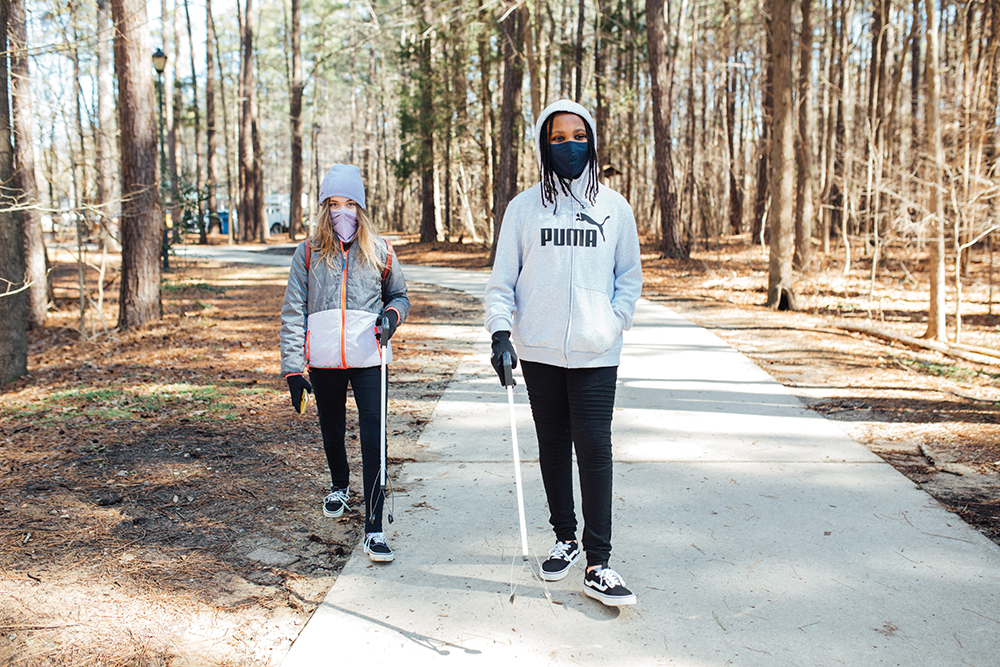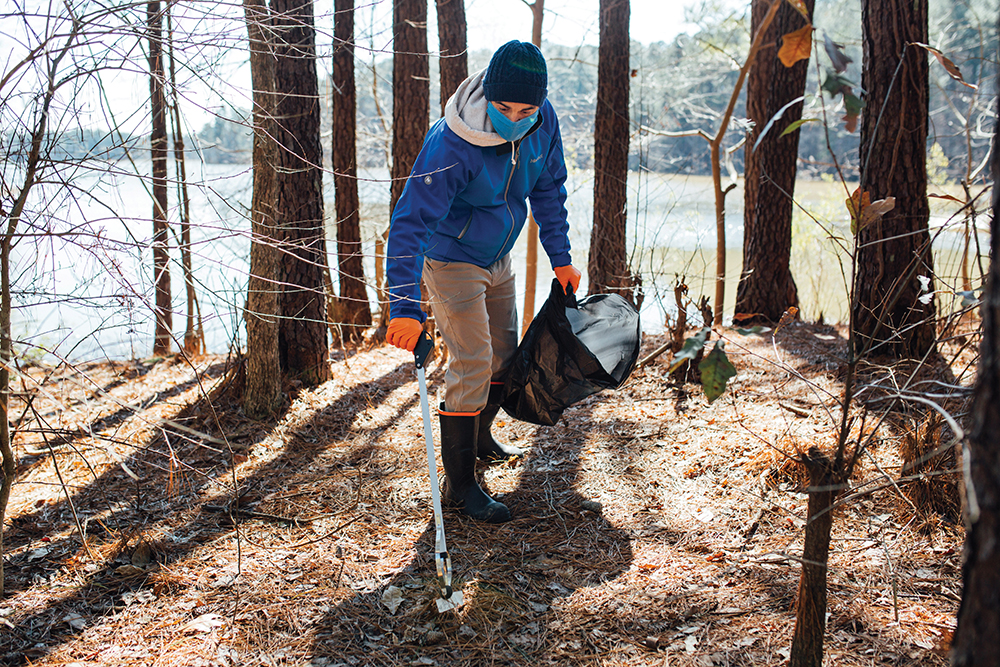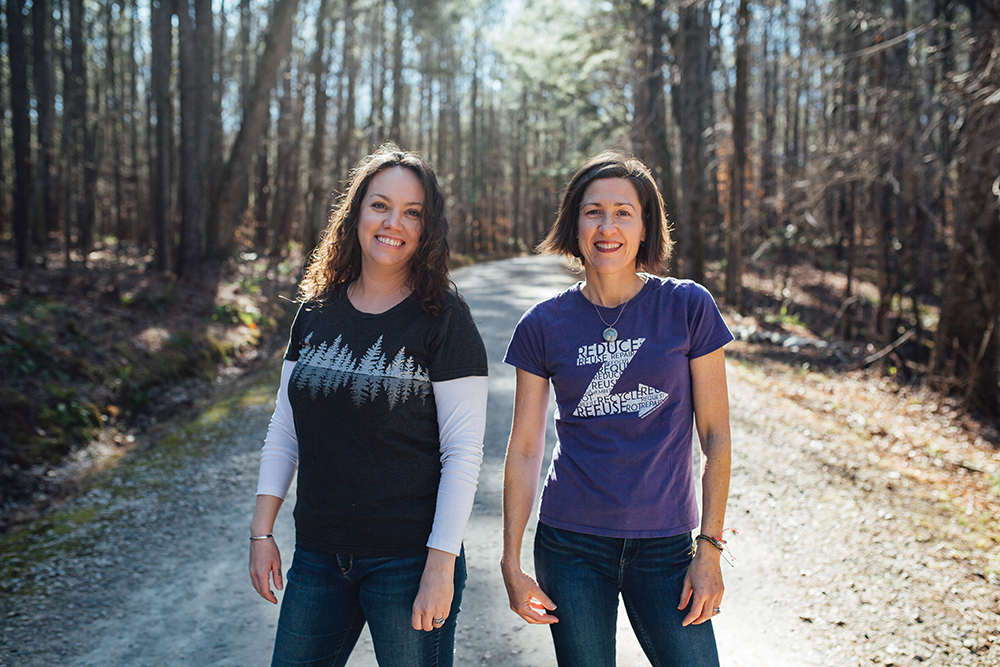Towards Zero Waste founders Dargan Gilmore and Leigh Williams are advocating for sustainability in the Raleigh-area and beyond.
by Kayla Guilliams | photography by Mick Schulte
When Leigh Williams prepared to go scuba diving in Kho Tao, Thailand, in 2003, she imagined what would be waiting for her on the ocean floor: a collage of oranges, pinks, and blues; myriad corals, fish, and sea flora. But when she went underwater, what awaited her was much duller.
“The coral was all faded, it wasn’t vibrant, and there was trash on the ocean floor,” she says. “Every single time I dove, I came up with trash in my back pocket. I picked batteries up off the bottom of the ocean, I picked up caps from the tops of plastic bottles — I picked up all kinds of weird trash.”
The trip started Williams on her environmental journey, eventually inspiring her to start the nonprofit Toward Zero Waste with a friend, Dargan Gilmore. The organization, based in Cary, aims to address plastic pollution and waste by encouraging communities, businesses, and local governments to adopt a “zero waste” mindset.
On social media, the #zerowaste hashtag pulls up images of glass jars full of dry goods, beautiful bamboo dinnerware, and glass spray bottles filled with homemade cleaning solutions. But its true principles are not tied to aesthetics: zero waste is about reducing what you buy, reusing what you have, sending little to be recycled, and aiming to send nothing to the landfill.
Williams and Gilmore first met through an international zero-waste Facebook group for those interested in adopting a low-waste lifestyle. “We ended up meeting on one of those posts where they ask where everybody’s from, and we figured out we were from the same area,” Williams says. “So we planned to meet up and that was it.”
Gilmore says she considers herself to be a lifelong environmentalist, someone who loves to hike and backpack. “But it was actually the movie An Inconvenient Truth that was a kind of turning point for me,” she says. The documentary about former U.S. Vice President Al Gore’s global warming campaign led Gilmore to understand the potentially catastrophic impacts of climate change on the planet. She ditched her gas car for an electric one and started being more conscious of how much plastic waste she was creating at home.
“What I know now, that I didn’t then, was that sight was just a sign of a much bigger problem,” says Williams of her revelation in Thailand. Every year, about 8 million tons of plastic waste escapes into the oceans from the coast. To avoid adding to it, Williams started making swaps when grocery shopping, using reusable bags instead of plastic ones and bringing her own containers to fill with bulk foods instead of buying them pre-packaged.

After Gilmore and Williams met, they decided to start their own localized Facebook groups — Toward Zero Waste Raleigh and Toward Zero Waste Cary — to connect with community
members and share what could and couldn’t be recycled, learn what the best low-waste shops in the area were, and trade tips for composting food scraps and paper.
As these groups started to grow (each now has over 1,000 members), more groups under the TZW name were started all across the state, from Wilmington to Chapel Hill to Asheville. Williams and Gilmore started teaching zero-waste classes, hosting free movie screenings, organizing landfill tours, and providing other free educational resources to their community, like guides to zero-waste shopping and a statewide green business directory. And each local TZW group, overseen by the two but led by a volunteer community director, started developing zero-waste events and initiatives within their own community.
Andrea Rushing, the community director for Cary, says she loves the opportunities TZW gives her to connect with her community, and as a homeschooling mom, helping educate on zero-waste swaps and principles is her favorite part. “I really believe that knowledge is the heart of everything,” she says. “I think that’s the key to zero waste, the sharing of information with your community. Because it can be so hard to change habits when you’re so used to what you were taught growing up.”
As the groups and initiatives kept growing, it made sense to make TZW a nonprofit instead of a “rogue little community organization,” Gilmore says. And by January 2020, after a slew of complicated paperwork and legal measures, they were. But just three months later, they were having to learn how to operate as a nonprofit during a pandemic. “It’s been bad and good, because we can reach a lot more people in virtual events than we can in person,” Gilmore says. “But it has definitely been quite the learning process.”

The pandemic has also come with an onslaught of trash. Paper masks, takeout containers, plastic grocery bags, and more — there’s been an upswing in single-use items as we avoid germs at all costs. TZW is now faced with the challenge of encouraging sustainability while still prioritizing safety, suggesting tips like swapping disposable masks for reusable ones and refusing as much excess waste as you can when ordering takeout.
While they’re currently focused on the pandemic, they’re also thinking about the best ways to make an impact when the world gets back to normal. TZW is volunteer-driven, and Williams and Gilmore agree that their success lies in providing their volunteers across the state with resources to start initiatives in their own communities. “I would like to see us be able to support volunteers who want to make a big impact, whether that’s helping them get a grant so they can open up a zero-waste store or helping them support legislation,” Williams says.
But for now, the duo says, they’re focusing on making the most of another year of virtual programming and reminding their community that every small change can make a big impact.
“We’ll have our virtual events like movie screenings, but we’ll also have a few outside community events, because we need our community,” Williams says. “But overall, we will be continuing to push back against this single-use mindset, because we have to stop it.”




